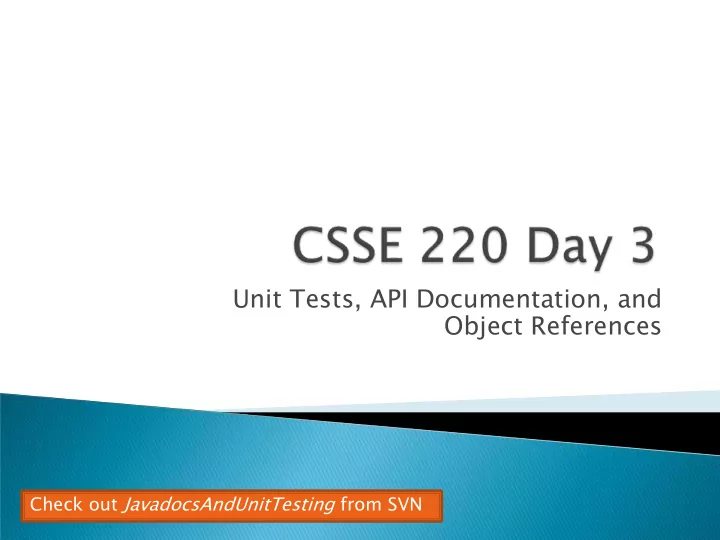

Unit Tests, API Documentation, and Object References Check out JavadocsAndUnitTesting from SVN
API Documentation, Docs in Eclipse, Writing your own Docs
What’s an API? ◦ Application Programming Interface The Java API on-line ◦ Google for: java api documentation 6 ◦ Or go to: http://java.sun.com/javase/6/docs/api/ Find the String class documentation: ◦ Click java.lang in the top-left pane ◦ Then click String in the bottom-left pane Q1,2
Setting up Java API documentation in Eclipse ◦ Should be done already, but if the next steps don’t work for you, we’ll fix that Using the API documentation in Eclipse ◦ Hover text ◦ Open external documentation (Shift-F2)
Written in special comments: /** … */ Can come before: ◦ Class declarations ◦ Field declarations ◦ Method declarations Eclipse is your friend! ◦ It will generate javadoc comments automatically ◦ It will notice when you start typing a javadoc comment
Description of method, usually starts with a verb. /** * Converts the original string to a @param tag * string representing shouting. followed by * parameter * @param input the original string name and (optional) * @return input in ALL UPPER CASE description. */ Repeat for each static String shout(String input) { parameter. return input.toUpperCase(); } @result tag followed by description of result. Omit for void methods.
Description of class /** * This class demonstrates unit testing * and asks you to use the Java API * documentation to find methods to solve * problems using Strings. * @author Tag followed by author * @author Curt Clifton. name and date * Created Sep 9, 2008. */ public class MoreWordGames { … }
Add javadoc comments to MoreWordGames
Don’t try to memorize the Java libraries ◦ Nearly 9000 classes and packages! ◦ You’ll learn them over time Get in the habit of writing the javadocs before re implementing the methods ◦ It will help you think before doing, a vital software development skill ◦ This is called programming with documented stubs ◦ I’ll try to model this. If I don’t, call me on it!
Test-driven Development, unit testing and JUnit
Writing code to test other code Focused on testing individual pieces of code (units) in isolation ◦ Individual methods ◦ Individual objects Why would software engineers do unit testing? Q3,4
JUnit is a unit testing framework ◦ A framework is a collection of classes to be used in another program ◦ Does much of the work for us! JUnit was written by ◦ Erich Gamma ◦ Kent Beck Open-source software Now used by mi millions ns of Java developers Q5
MoveTester in Big Java shows how to write tests in plain Java Look at JUnitMoveTester in today’s repository ◦ Shows the same test in JUnit ◦ Let’s look at the comments and code together…
Test “boundary conditions” ◦ Intersection points: - 40℃ == - 40℉ ◦ Zero values: 0℃ == 32℉ ◦ Empty strings Test known values: 10 0℃ == 212℉ ◦ But not too many Tests things that might go wrong ◦ Unexpected user input: “zero” when 0 is expected Vary things that are “important” to the code ◦ String length if method depends on it ◦ String case if method manipulates that
Walk through creating unit tests for shout in MoreWordGames Test whisper and holleWerld
Differences between primitive types and object types in Java
Variables of number type store values Variables of class type store references ◦ A reference is like a pointer in C, except Java keeps us from screwing up No & and * to worry about (and the people say, “Amen”) Consider: 1. int x = 10; 2. int y = 20; 3. Rectangle box = new Rectangle(x,y,5,5); Q6
Actual value for number types Referen rence value for object types ◦ The actual obje ject ct is not copied pied ◦ The refere erence nce va value ue (“the pointer”) is copied ied Consider: 1. int x = 10; 2. int y = x; 3. y = 20; 4. Rectangle box = new Rectangle(5,6,7,8); 5. Rectangle box2 = box; 6. box2.translate(4,4); Q7,8
Begin the Written Exercise from Homework 3 Q9,10
Recommend
More recommend